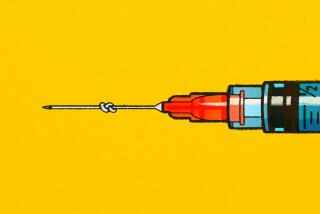Medical merchants
- Share via
LAST summer, Los Angeles resident Paul Hanneman visited a dermatologist for a simple skin check. He left the doctor’s office an hour later with far more than he bargained for. The doctor had recommended, and he had purchased, more than $60 in creams and ointments from her personal product line.
“It was strange to be sold to like that,” Hanneman says. But not uncommon.
Pediatricians in Encino sell diaper cream for infants, umbilical-care swabs for newborns and bath soap for babies; dermatologists in Los Angeles peddle skin cleansers, moisturizers and sunscreens; and gynecologists in Beverly Hills sell nutritional supplements.
Some physicians offer such products as a convenience for their patients or because they believe the products are superior to goods already on the market. Others are motivated, in large part, by financial gain. Whatever the reason, the sale of such goods raises ethical questions for doctors and a very practical question for patients: Should I buy what my doctor is trying to sell me?
Many medical ethicists -- and the American Medical Assn. -- have a fairly straightforward answer for doctors: Don’t do it. They say the practice is unprofessional and undermines physicians’ primary obligation: to serve the interests of their patients. “Caring for the patient must be of paramount importance,” says Dr. Robert Sade, chairman of the American Medical Assn.’s Council on Ethical and Judicial Affairs. “The patient’s interests must come first.”
When product sales generate a profit for doctors, this basic rule of medical ethics is jeopardized. Although treatment recommendations should be based solely on medical considerations and patient needs, a financial stake in the sale of a treatment can influence physicians’ decision-making. “When products are sold in a doctor’s office, the interest of the patient can be pushed into the background,” Sade says.
Patient trust can also be eroded. Doctors are in a position of influence, and the sale of products places undue pressure on patients who feel compelled to buy them simply because their physician tells them to. “Physicians have authority that puts a special weight on whatever it is they say,” says Sade. “It’s important that this authority is not misused.”
The practice can also affect a physician’s image. “The sale of products undermines the professionalism of the physician,” Sade says. “It makes them more of a merchant than a professional caregiver.”
That’s not to say that the sale of products is never warranted. In some instances, it is entirely justified. Products that clearly serve the immediate and pressing needs of patients should be made available -- such as the sale of slings and crutches by orthopedists. To avoid a potential conflict of interest, however, the AMA and ethicists recommend that these items always be sold at cost.
Guidelines for patients are less clear. But they should keep in mind that simply because a doctor is selling a product does not mean that it works. In fact, many products being sold in doctors’ offices have never undergone rigorous, scientific testing and their effectiveness is entirely unproved.
Comparable products are often available elsewhere, frequently at much lower cost. A 3-ounce tube of diaper ointment sold by pediatricians costs $16, though 4 ounces of Desitin cream containing the same active ingredient, zinc oxide, sells for less than $7 at drugstores. A tube of “recovery cream” widely sold by dermatologists goes for $24, though the same active ingredient is sold as Vaseline for a little more than $1. Although these products may look, smell and feel slightly different, they generally work the same.
Further, private-label products carrying a physician’s name and a premium price tag aren’t always what they appear to be. Although the labeling of these products suggests that they are doctor-formulated, many of them are not. Some doctors simply personalize an existing line of products by adding their name and logo to it. Only the label distinguishes one doctor’s private line from the next.
Finally, it’s important to keep in mind that the most vital products physicians have to sell their patients are their knowledge, care and concern. No cream or lotion will buy benefits that rival that.
As for Hanneman, it’s not the $60 he spent that he regrets, it is the experience itself. He’s no longer using the products he purchased and is in the market for a new dermatologist.
Dr. Valerie Ulene is a board-certified specialist in preventive medicine practicing in Los Angeles. She can be reached at themd@att.net. The MD appears the first Monday of the month.
More to Read
Inside the business of entertainment
The Wide Shot brings you news, analysis and insights on everything from streaming wars to production — and what it all means for the future.
You may occasionally receive promotional content from the Los Angeles Times.









